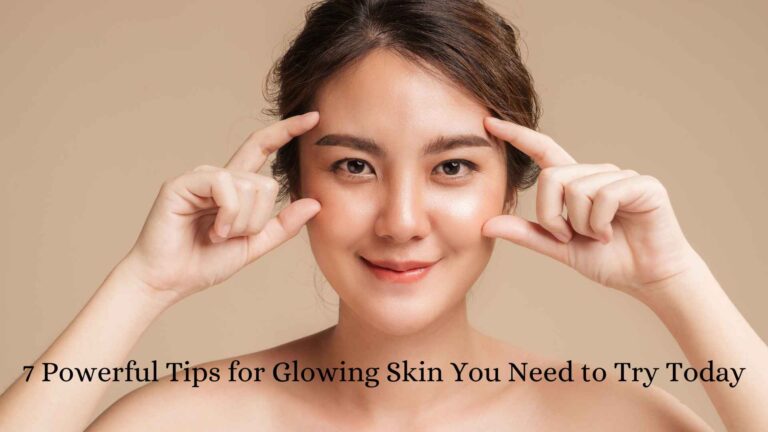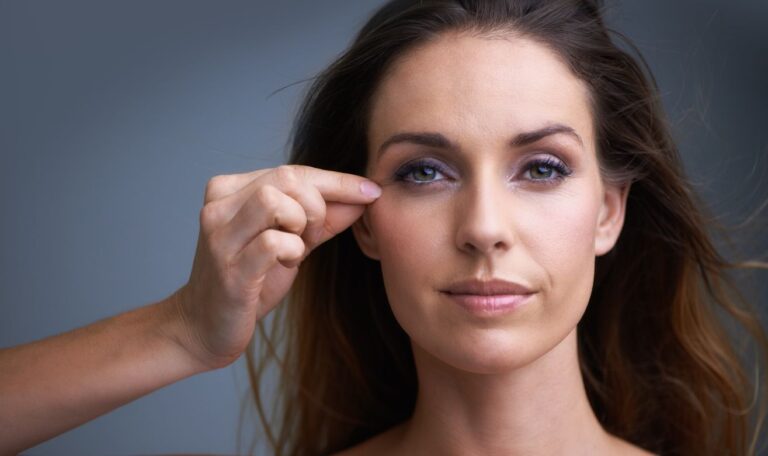10 Secrets How to Get Clear and Glowing Skin in 2025 | Healthier Skin
Introduction
Are you wondering how to get clear and glowing skin? You’re not alone. A radiant complexion is a sign of health and vitality, and achieving it can be easier than you think. From building the perfect skincare routine to understanding the importance of diet, hydration, and professional treatments, unlocking how to get clear skin is about consistency and care. This comprehensive guide dives deep into the secrets to achieving healthier skin, blending science, expert tips, and practical steps. Whether you’re dealing with acne, dryness, or dullness, these strategies will help you achieve that glowing complexion you’ve always wanted.
What’s the Best Daily Routine for Clear and Glowing Skin?
Your daily skincare routine plays a pivotal role in achieving clear and glowing skin. It’s not just about using the most expensive products but about consistency and using the right ones for your skin type.
Morning Routine:
Start your morning with a gentle cleanser that suits your skin type. Oily and acne-prone skin may benefit from a salicylic acid cleanser, while dry or sensitive skin thrives with hydrating options. Cleansing removes overnight impurities and prepares your skin for the day ahead.
Follow with a toner or essence to restore balance. A Vitamin C serum is next—it’s a powerhouse for brightening the complexion, reducing dark spots, and fighting free radicals that contribute to premature aging. Seal this step with a lightweight moisturizer that hydrates without clogging pores.
The final, and most crucial, step is sunscreen. A broad-spectrum SPF of at least 30 protects your skin from harmful UV rays, which are a leading cause of aging, hyperpigmentation, and even skin cancer. Remember, sunscreen is essential even on cloudy days or when staying indoors.
Evening Routine:
Your nighttime routine is about repair and recovery. Begin with a double cleanse—an oil-based cleanser to dissolve makeup and sunscreen, followed by a water-based cleanser to remove dirt and impurities.
Use active treatments based on your skin concerns. Retinol is a popular choice for its ability to promote cell turnover, smooth fine lines, and reduce acne. Alternatively, niacinamide can help soothe the skin and even out tone. Finally, lock in moisture with a nourishing nighttime cream or oil to keep your skin hydrated as you sleep.
Weekly Extras:
Exfoliate 1-2 times a week to remove dead skin cells and encourage new cell growth. Chemical exfoliants with AHAs (like glycolic acid) or BHAs (like salicylic acid) are effective yet gentle. Incorporating a hydrating mask once a week can also give your skin an extra boost.
Consistency is the secret. Stick to your routine, and within weeks, you’ll notice smoother, brighter, and clearer skin.
How Does Diet Influence Your Skin’s Health?
The connection between diet and skin health is profound. What you eat directly impacts your skin’s appearance, making diet one of the most important factors in achieving clear and glowing skin.
Nutrients Your Skin Loves:
Foods rich in antioxidants, such as blueberries, spinach, and dark chocolate, combat free radicals that cause dullness and premature aging. Vitamin C, found in citrus fruits and bell peppers, enhances collagen production, improving skin elasticity and reducing fine lines. Omega-3 fatty acids in fatty fish like salmon, chia seeds, and walnuts keep inflammation at bay and maintain your skin’s natural barrier.
Zinc, a mineral found in nuts, seeds, and shellfish, regulates oil production and speeds up skin healing. Biotin-rich foods like eggs and avocados help strengthen your skin, reducing flakiness and dryness.
Foods to Avoid:
Dairy and high-glycemic foods, such as sugary snacks and white bread, can trigger acne and inflammation. Processed foods and excessive alcohol dehydrate the skin, making it look dull and tired.
Hydration from Within:
Drinking at least 8-10 glasses of water daily keeps your skin hydrated, improving elasticity and flushing out toxins. Herbal teas like green tea and chamomile also offer skin benefits, from reducing redness to soothing irritation.
Supplements for Skin Health:
While a balanced diet should be your primary focus, supplements like collagen peptides, Vitamin E, and hyaluronic acid can enhance your skin’s appearance. Always consult with a healthcare provider before starting supplements.
A nutritious diet is more than a skincare tip; it’s a long-term investment in your overall health and radiance.
Why Is Hydration Key to Healthier Skin?
Hydration is fundamental to understanding how to get clear and glowing skin. Dehydration can make your skin look dull, emphasize fine lines, and cause a rough texture. Proper hydration keeps your skin plump, smooth, and radiant.
Internal Hydration:
Drink plenty of water—at least 2 liters daily. Water helps flush out toxins, supports blood circulation, and ensures your skin remains hydrated from within. Water-rich foods like cucumbers, watermelon, and celery are also excellent choices to maintain hydration levels.
Topical Hydration:
Use skincare products formulated with hydrating ingredients. Hyaluronic acid is a superstar in attracting moisture to the skin, while glycerin and aloe vera help lock it in. Layer a hydrating serum under your moisturizer to enhance hydration retention.
Avoid Dehydrating Factors:
Limit caffeine and alcohol consumption as they dehydrate the skin. Similarly, avoid harsh cleansers or over-exfoliating, which can strip the skin of its natural oils.
Environment Matters:
In dry climates or during winter, using a humidifier can add moisture to the air, preventing your skin from drying out. Opt for heavier moisturizers during colder months to protect your skin barrier.
Hydration is the easiest and most effective way to achieve and maintain a healthy glow.
Can a Proper Skincare Routine Transform Your Skin?
Absolutely! A well-tailored skincare routine is your roadmap to achieving clear and glowing skin. The key lies in consistency and choosing products that suit your specific skin type and concerns.
Steps to Build Your Routine:
- Cleanse: Start and end your day with a gentle cleanser. This step removes impurities, leaving your skin ready for treatment.
- Treat: Serums with active ingredients like Vitamin C, niacinamide, or retinol address specific concerns like dullness, acne, or fine lines.
- Moisturize: No matter your skin type, moisturizing is essential. Lightweight gel formulas work well for oily skin, while cream-based products benefit dry skin.
- Protect: Sunscreen is a non-negotiable step in your routine. Broad-spectrum SPF prevents UV damage, keeping your skin youthful and radiant.
Customizing Your Routine:
Different skin types require different products. For example, those with oily skin may benefit from mattifying products, while dry skin thrives on deeply hydrating ones.
The Power of Consistency:
Transformations don’t happen overnight. Stick to your routine for at least 4-6 weeks to see significant improvements. Over time, a proper skincare regimen will enhance your skin’s texture, tone, and clarity.
What Role Does Sleep Play in Achieving Clear Skin?
Sleep is often referred to as “beauty sleep” for a good reason. If you’re aiming for clear and glowing skin, prioritizing quality sleep is non-negotiable. While you rest, your body undergoes repair processes that directly benefit your skin’s health and appearance.
Skin Renewal During Sleep:
When you sleep, your body produces growth hormones that stimulate cell regeneration. This process helps repair damage caused by UV exposure, pollution, and daily wear and tear. Collagen production also peaks during sleep, keeping your skin firm, elastic, and wrinkle-free.
Consequences of Sleep Deprivation:
Lack of sleep disrupts your skin’s renewal process, leading to dullness, puffiness, and dark circles. High cortisol levels from insufficient rest can exacerbate acne and trigger inflammation, making your skin more prone to redness and irritation. Chronic sleep deprivation accelerates premature aging, causing fine lines and sagging skin.
Tips for Better Sleep and Healthier Skin:
- Create a Sleep-Friendly Environment: Keep your bedroom cool, dark, and quiet. Use blackout curtains and white noise machines if necessary.
- Adopt a Pre-Sleep Skincare Routine: Remove makeup, cleanse thoroughly, and apply a hydrating night cream or serum. Ingredients like hyaluronic acid, peptides, and retinol work wonders while you sleep.
- Switch to Silk Pillowcases: These reduce friction on your skin, minimizing wrinkles and irritation. Silk also absorbs less product, ensuring your skincare stays on your face.
- Stick to a Sleep Schedule: Consistent sleep and wake times help regulate your body’s internal clock, enhancing overall skin health.
How Much Sleep Do You Need?
Aim for 7-9 hours of uninterrupted sleep each night. Anything less can compromise your skin’s ability to recover and rejuvenate.
Bonus Tip:
Elevating your head slightly while sleeping can reduce puffiness and prevent fluid retention.
Remember, no amount of skincare products can replace the benefits of quality sleep. It’s one of the simplest, most cost-effective ways to maintain healthier skin.
Are Natural Remedies Effective for Clear Skin?
When it comes to how to get clear and glowing skin, natural remedies are a gentle, budget-friendly way to complement your skincare routine. While not all home remedies are scientifically backed, many offer proven benefits for healthier skin.
Popular Natural Remedies:
- Honey: This natural humectant hydrates your skin while its antibacterial properties help fight acne. Apply raw honey as a mask for 10-15 minutes and rinse off for softer, clearer skin.
- Aloe Vera: Known for its soothing properties, aloe vera reduces redness and irritation while deeply hydrating the skin. Use fresh aloe vera gel as a moisturizer or mask.
- Turmeric: Packed with anti-inflammatory and antioxidant properties, turmeric helps brighten the complexion and reduce acne scars. Mix turmeric powder with yogurt and apply it as a mask for glowing skin.
- Green Tea: Rich in polyphenols, green tea fights free radicals, reduces inflammation, and calms acne-prone skin. Use cooled green tea bags as a compress or include it in DIY face masks.
- Oatmeal: Oatmeal is an excellent natural exfoliant and soothing agent. A paste of oatmeal and honey gently removes dead skin cells while calming irritation.
The Do’s and Don’ts of Natural Remedies:
- Do patch tests: Always test a small area of skin before applying a new ingredient to avoid allergic reactions.
- Don’t overuse: Even natural ingredients can irritate the skin if over-applied. Use remedies 1-2 times per week.
Combining Remedies with a Routine:
Natural remedies work best alongside a structured skincare routine. For severe skin concerns like cystic acne or rosacea, consult a dermatologist rather than relying solely on DIY solutions.
By incorporating natural remedies, you can enhance your skin’s health and appearance without exposing it to harsh chemicals.
How Do You Protect Your Skin from Environmental Damage?
Environmental factors like UV rays, pollution, and harsh weather can significantly impact your skin’s health, making protection crucial in achieving clear and glowing skin. External stressors not only cause dullness but can also accelerate aging, trigger acne, and worsen hyperpigmentation.
Sun Protection:
UV rays are one of the most damaging environmental factors. Prolonged exposure can lead to sunburn, dark spots, and even skin cancer. To safeguard your skin:
- Apply a broad-spectrum sunscreen with SPF 30 or higher daily, regardless of the weather.
- Reapply sunscreen every two hours if you’re outdoors, especially after sweating or swimming.
- Wear protective clothing, wide-brimmed hats, and UV-blocking sunglasses for additional defense.
Pollution Defense:
Pollutants in the air, such as smoke and dust, can clog pores and cause oxidative stress, leading to premature aging. Combat these effects by:
- Cleansing thoroughly at the end of the day to remove dirt and pollutants.
- Using antioxidant-rich serums with Vitamin C or E to neutralize free radicals.
- Creating a physical barrier with moisturizers or primers before stepping out.
Weather Considerations:
- In dry climates, use heavier moisturizers and consider adding a humidifier to your space.
- During colder months, protect your skin with occlusive products to prevent moisture loss.
Consistent environmental protection ensures your skin stays resilient, youthful, and glowing.
Why Is Regular Exercise a Secret to Glowing Skin?
Exercise is a powerful, natural way to enhance your skin’s health and achieve clear and glowing skin. The benefits of physical activity extend beyond your muscles and heart—it directly influences your skin’s appearance.
Improved Blood Circulation:
When you exercise, your heart pumps more blood, delivering oxygen and nutrients to your skin cells. This enhanced circulation aids cell regeneration, resulting in a vibrant, healthy glow.
Sweat and Detoxification:
Sweating during exercise helps purge toxins from your body, unclogging pores and reducing the likelihood of breakouts. However, it’s essential to cleanse your skin post-workout to prevent sweat and bacteria from lingering.
Stress Reduction:
Exercise reduces cortisol levels, which are linked to stress-related acne and inflammation. Activities like yoga, jogging, or even dancing can calm your mind and improve your skin’s clarity.
Hormonal Balance:
Regular physical activity helps balance hormones, which can be beneficial for those struggling with hormonal acne.
How to Maximize Skin Benefits from Exercise:
- Always remove makeup before exercising to prevent clogged pores.
- Follow a post-workout skincare routine, including cleansing and moisturizing.
- Stay hydrated during workouts to replenish lost fluids and keep your skin plump.
By incorporating exercise into your lifestyle, you’ll enjoy not just a fitter body but also a glowing complexion.
How Important Are Professional Treatments for Skin Health?
Professional skincare treatments can be game-changers in your journey to clear and glowing skin, especially for stubborn concerns like acne scars, pigmentation, or signs of aging. While home routines are effective, professional treatments delve deeper to provide more dramatic and lasting results.
Popular Professional Treatments:
- Facials: Regular facials cleanse, exfoliate, and nourish the skin, promoting a clear and radiant complexion.
- Chemical Peels: These treatments remove the top layer of dead skin cells, revealing smoother, brighter skin underneath. They’re excellent for reducing acne scars and uneven texture.
- Laser Therapy: Lasers target deeper layers of the skin, improving collagen production and addressing issues like pigmentation and fine lines.
- Microdermabrasion: This exfoliation technique smooths rough patches and stimulates skin renewal.
- Microneedling: This procedure boosts collagen by creating micro-injuries, leading to firmer and clearer skin.
Choosing the Right Treatment:
Always consult a dermatologist or licensed aesthetician before undergoing treatments. They can recommend procedures tailored to your skin type and concerns.
Combining Professional Care with Daily Routines:
Professional treatments offer impressive results, but their effectiveness depends on maintaining a consistent skincare routine at home.
By investing in professional care, you can accelerate your journey toward healthier skin and long-lasting radiance.
🔥 Huge Sale: Trendy Clothes with Up to 10% OFF + FREE Shipping! Shop Now Before the Deals End! 🛍️
Conclusion
Achieving clear and glowing skin is not just about luck or genetics—it’s about adopting the right habits, routines, and lifestyle changes. By combining a consistent skincare regimen, a nutrient-rich diet, proper hydration, and adequate sleep, you can nurture your skin to look and feel its best. Additionally, protecting your skin from environmental stressors, incorporating natural remedies, and seeking professional treatments when necessary can take your efforts to the next level.
The journey to clear skin requires patience and persistence, but the rewards are worth it. Glowing, healthy skin is a reflection of overall wellness and self-care. So, commit to these practices, listen to your skin’s unique needs, and embrace the transformation. With the right strategies, achieving healthier skin is within your reach.
FAQs
1. How can I get clear and glowing skin naturally?
Ans. To achieve clear and glowing skin naturally, start by maintaining a healthy diet rich in antioxidants, vitamins, and omega-3 fatty acids. Stay hydrated by drinking plenty of water and using moisturizers with hydrating ingredients like hyaluronic acid. Adopt a consistent skincare routine that includes cleansing, exfoliating, and sunscreen. Natural remedies like honey masks, aloe vera, and turmeric-based treatments can also boost your skin’s radiance without harsh chemicals.
2. What foods should I avoid to maintain clear skin?
Ans. Certain foods can trigger acne and dullness, hindering your efforts to achieve clear and glowing skin. Avoid high-glycemic foods like sugary snacks, white bread, and soda, as they can lead to inflammation and breakouts. Dairy products may exacerbate acne in some individuals, and processed foods can dehydrate the skin. Instead, focus on whole, nutrient-rich foods to nourish your skin from within.
3. How does sleep affect my skin’s appearance?
Ans. Sleep is crucial for maintaining clear and glowing skin. During sleep, your body repairs and regenerates skin cells, boosts collagen production, and reduces inflammation. Lack of sleep leads to dullness, puffiness, and increased stress hormones, which can trigger breakouts. Aim for 7-9 hours of quality sleep each night to support your skin’s natural renewal process.
4. Can exercise improve my skin’s health?
Ans. Yes, regular exercise can significantly enhance your skin’s health and contribute to clear and glowing skin. Exercise improves blood circulation, delivering oxygen and nutrients to your skin cells. Sweating helps detoxify your pores, while reduced stress levels from exercise lower the chances of breakouts. Just ensure you cleanse your face after workouts to avoid clogged pores.
5. What role does sunscreen play in achieving clear skin?
Ans. Sunscreen is essential for achieving and maintaining clear and glowing skin. UV rays cause premature aging, dark spots, and uneven skin tone. A broad-spectrum sunscreen with SPF 30 or higher protects your skin from these harmful effects. Reapply every two hours when outdoors, and make sunscreen a non-negotiable step in your daily routine, even on cloudy days.
6. Are professional treatments necessary for glowing skin?
Ans. Professional treatments can be highly beneficial for achieving clear and glowing skin, especially if you’re dealing with persistent concerns like acne scars, pigmentation, or fine lines. Treatments such as chemical peels, laser therapy, and microneedling provide deeper skin rejuvenation than at-home care. However, combining these treatments with a consistent skincare routine ensures optimal and long-lasting results.













